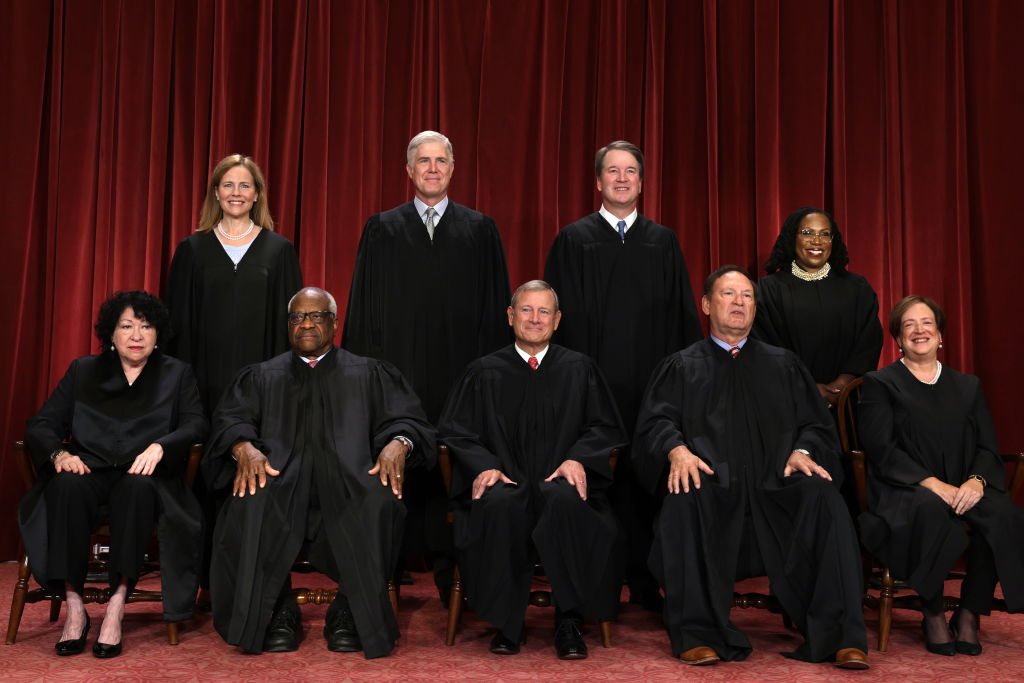The Supreme Court today is hearing arguments against Tennessee’s statewide ban on prescribing puberty blockers and hormone replacement therapy for minors with gender dysphoria. The challenge to the state law is being led by the Biden administration and the American Civil Liberties Union and is brought on behalf of three teens with gender dysphoria, their parents and a doctor. Their lawyer is also transgender.
The Tennessee law came about during a period of very fraught debate over how to treat children who suffer from gender dysphoria. Major American medical associations, hospitals and psychiatrist groups claim that there is only one way to treat “trans kids”: through delaying puberty with the use of puberty blockers — which they describe as completely reversible — and then starting hormone replacement therapy and, eventually, surgery. Parents struggling with how to help their distressed children are faced with a form of emotional blackmail from their medical providers: would you rather have a dead son or a living daughter? The implication being that their child will commit suicide if they are not granted the opportunity to transition.
However, available science doesn’t support the idea that gender-dysphoric children require any medical intervention beyond therapy. America mirrors its treatment path on the “Dutch model,” which relied on studies that excluded participants with poor outcomes and ignored negative side effects from the observed treatment paths. The Dutch are now having doubts about their own pioneering model, with parliament asking the government’s research arm to do further investigation of the efficacy of puberty blockers.
Other European countries have followed suit, including Britain, whose National Health Service commissioned a report that found scant evidence for medicinal or surgical interventions for gender-dysphoric children. Dr. Hillary Cass wrote, “While a considerable amount of research has been published in this field, systematic evidence reviews demonstrated the poor quality of the published studies, meaning there is not a reliable evidence base upon which to make clinical decisions, or for children and their families to make informed choices.”
The NHS responded by banning the prescription of puberty blockers outside of clinical research settings. These cautious approaches are further driven by other research that shows a vast majority — somewhere between two-thirds and eight out of ten — of youth with gender dysphoria will “desist” or grow out of it by adulthood.
US medical groups have not taken European skepticism to heart, and additional cultural battles on the issue — such as whether boys with gender dysphoria should be allowed to play in girls’ sports or use their bathrooms and locker rooms, if teachers should play a role in keeping secret a child’s supposed gender identity if parents do not approve of a transition and even if a state should remove “trans kids” from the home of unsupportive parents — have many Americans wanting to pump the brakes. Some politicians have taken note, and in more than two dozen states they’ve voted to implement their own bans on “gender-affirming care” for minors.
That brings us to today’s arguments at SCOTUS, where defendants of the law will likely bring up the adverse side effects (some permanent) of long-term use of puberty blockers and hormone therapies, the inability of minors to consent to medical procedures, the lack of scientific evidence backing up “gender-affirming care” and the evidence that instead supports a “wait-and-see” approach. The challengers to the law will claim preventing access to medical intervention is a form of discrimination against “trans kids” that violates their right to equal protection under the Constitution. To support this argument, they will point out that puberty blockers are regularly prescribed for other medical issues, like precocious puberty or endometriosis, yet blocked for “transgender care.” Of course, off-label uses of drugs are not infrequently banned if the potential side effects outweigh the demonstrated benefits, regardless of the identity of the patient.
We’ll be following this case here at Culture Shock, as SCOTUS’s decision will be pivotal in the fight against medical malpractice in the name of gender affirmation.
Are black babies the victims of medical racism?
A study was published in August 2020 that claimed black newborns were more likely to die if they were treated by white doctors as opposed to black doctors. The implication was that white doctors had explicit or implicit biases that caused them to give substandard care to babies of a different race. In short: systemic racism was killing black babies.
“Black newborns more likely to die when looked after by white doctors,” a CNN headline about the study read at the time. The study also claimed that black doctors do not similarly allow racism to affect their care for white babies:
The mortality rate of black newborns in hospital shrunk by between 39 percent and 58 percent when black physicians took charge of the birth, according to the research, which laid bare how shocking racial disparities in human health can affect even the first hours of a person’s life.
By contrast, the mortality rate for White babies was largely unaffected by the doctor’s race.
If true, this would be a shocking indictment of white doctors. The authors of the study suggested that hospitals “invest in efforts to reduce such biases and explore their connection to institutional racism.” Earlier this year, one of the study’s authors, Rachel Hardeman, landed on the TIME 100 list for her work in “advancing birth equity.”
Regular readers of this newsletter know exactly where this is going. A newer analysis of the study published in the same journal found that the authors left out an extremely important cofounding variable: birth weight. Black newborns are about three times more likely than white newborns to be at a very low birth weight, and when added to the study, this variable renders statistically insignificant the difference in black newborn deaths when being treated by white doctors versus black doctors. Why is this the case? The analysis finds that white doctors are significantly more likely to be tasked with caring for black babies with very low birth weights. “In a model that fails to control for these birth weights directly, white doctor/black patient combinations will thus appear particularly lethal,” the analysis’s authors explain.
This new analysis was published earlier this fall but, unsurprisingly, did not get much coverage in mainstream sources.
LPGA underlines the ‘L’
The LPGA and US Golf Association released new rules today effectively barring men who identify as women from competing in female professional golf events. The policy will go into effect starting with the 2025 season. Men who identify as women may only compete in LPGA events if they did not go through any part of male puberty and have low concentrations of testosterone. An LPGA statement on the development reads, “The policy — informed by a working group of top experts in medicine, science, sport physiology, golf performance and gender policy law — was developed with input from a broad array of stakeholders and prioritizes the competitive integrity of women’s professional tournaments and elite amateur competitions. This working group has advised that the effects of male puberty confer competitive advantages in golf performance compared to players who have not undergone male puberty.”
The former policy allowed men who underwent sex change surgeries as adults to compete in ladies’ events. The LPGA allowed one such man, Hailey Davidson, to tee up in female tournaments this year. A petition from the Independent Women’s Forum, signed by hundreds of female golfers, said, “the male advantage in driving the ball is estimated around a 30 percent performance advantage” and that “anatomical differences between males and females affect clubhead speed and regulating consistency at ball contact.” Testosterone suppression, they argued, does not negate the effects of male puberty. Davidson was the first transgender golfer to win a women’s professional golf tournament and blamed complaints from women golfers on “their own athletic failures.”


























Leave a Reply